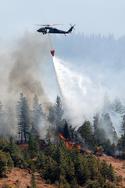High speed rail may be proposed as a climate change panacea here and elsewhere, but the results on the ground are less than promising. California Governor Gavin Newsom announced this week that the California high speed rail project would be scaled back to the route between Bakersfield and Merced, in the San Joaquin Valley (which the state has enough money for). In his “state of the state” speech the Governor said “…let’s be real. The project, as currently planned, would cost too much and take too long. There’s been too little oversight and not enough transparency.” read more »
Environment
Pulling the Plug on HS2 (London-Birmingham High Speed Rail)?
- Login to post comments
Getting-Off-Fossil Fuels: A Medieval Method For Reducing Unfunded Pension Liabilities
Looking back just a few short centuries, we’ve come a long way since the horse and buggy days, before medications, doctors, cosmetics, plastics fertilizers, and transportation from jet engines, diesel trucks, and automobiles that has been the primary cause of globalization, as well as the thousands of products that we get from fossil fuels that are the basis of every infrastructure in our daily lives. read more »
- Login to post comments
Party of the People? Or the Oligarchs?
The Trump uprising, with a renegade capitalist serving as the tribune of the forgotten working class, appears headed toward an inevitable denouement. Trump’s intemperance, jingoism and lack of political skills have undermined the GOP’s ability to reach beyond its base in the South, the exurbs and parts of middle America. read more »
- Login to post comments
Low-Density Fire Buffer
Someone in Bend must be reading this blog, or at least thinking along the same lines. In 2017, after the Wine Country fires had burned homes in Santa Rose, the Antiplanner noted that the problem was the homes were too dense and needed a buffer of low-density homes around them. I made the same point after the Camp Fire burned homes in Paradise.
Now Deschutes County is zoning a buffer between Bend and the national forest for low-density housing. read more »
- Login to post comments
Will Canada Break Up Over Carbon Dioxide?
Countries have broken up for very serious reasons like slavery, religious differences and ethnic tensions. But, so far, never in history has a country been at risk of breaking up because of a harmless gas – carbon-dioxide. Canada could, thanks to an ideologically-driven federal government. read more »
- Login to post comments
The Middle Kingdom and the U.S. Economy
In the poker match between President Donald Trump and China’s new all-but-emperor, Xi Jinping, it’s widely assumed that Xi holds the best hand. Yet President Xi’s hand may not be as awesome as it appears, while the United States, even under this very flawed president, may hold some fine cards. read more »
- Login to post comments
Centennial at Tejon Ranch
I was included in an e-mail thread last week about a 19,000 unit master planned community on the far edge of Los Angeles County. There’s an on-going debate about whether this is part of California’s housing solution or part of the problem. Centennial is one of three proposed residential developments at Tejon Ranch. It hugs the border of Kern County thirty miles outside of Bakersfield and three mountain ranges from LA proper. After a couple of decades of negotiations it was finally approved by the authorities. read more »
- Login to post comments
COP 24: Paris Agreement plans to reduce greenhouse gases miss the mark
Just like the TV commercial that asked, “where’s the beef,” it’s time to focus on whats the substance behind demands we reduce our dependency on fossil fuels? Why aren’t any of the proposed “solutions” to reduce greenhouse gases (GHG) actually effective? read more »
- Login to post comments
The First Shots in the Climate Wars
In launching their now successful protests against President Emmanuel Macron’s gas hike, the French gilets jaunes (yellow jackets) have revived their country’s reputation for rebelling against monarchial rule. It may well foreshadow a bitter, albeit largely avoidable, battle over how to address the issue of climate change. read more »
- Login to post comments
Can “Renewables” Dent The World’s Need For Electricity?
All 7.8 billion on this planet want affordable, scalable, reliable electricity. And for countries like the United States, China, India, most of Africa and the European Union (EU) the cheapest way to produce electrons is by burning coal. Carbon dioxide emissions are rising because the world will need more energy in the decades ahead in order to raise the living standard for the 1.3 billion people living in energy poverty according to the International Energy Agency (IEA). read more »





















